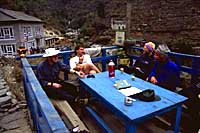|
No Access to Safe Water Thursday, August 20, 1998 With the Nepalese Government announcement that no bottled water will be allowed in the Everest region, one must wonder what alternatives are left to trekkers and villagers. Most visitors to the Khumbu agree that trying to reduce the trash on and near Everest is commendable, but the message from this latest ban may be that clean water is not all that important. Veteran travelers to the region predict that the already marginal "sanitary conditions" will be worsened by sick trekkers without access to safe water. As it is likely that the Nepalese government will not provide a clean water alternative, trekkers will be forced to iodine their water, buy hot drinks or other "boiled water" items at tea houses (and hope the lodge owner is honest). There are few other real alternatives, except to drink unsanitized water, deal with dehydration issues, and stock up on soft drinks.
One must applaud Nepal's attempt at taking substantive environmental action, but the latest ruling could be seen as another example of quick fixes to wilderness issues, without an evaluation of long term results. While lower portions of the Khumbu have streams to draw and boil water from, many high-altitude areas are dry and forbidding. Most repeat visitors to the Khumbu agree that most of the trash is left behind by one-time Everest-region visitors, as climbers and trekkers who return year after year have an affection for the region and therefore much greater environmental sensitivity to their impacts on the overcrowded valleys. Other trash reduction options such as costly bottle deposits or raising the cost of trekking permits (which can then be used to hire workers to remove trash) are two of many options. It is the day-to-day independent trekkers who will suffer the most, as they don't come to Everest with yak teams, porters and ways of getting around laws. — Gordon Janow, Mountain Zone Correspondent
|

